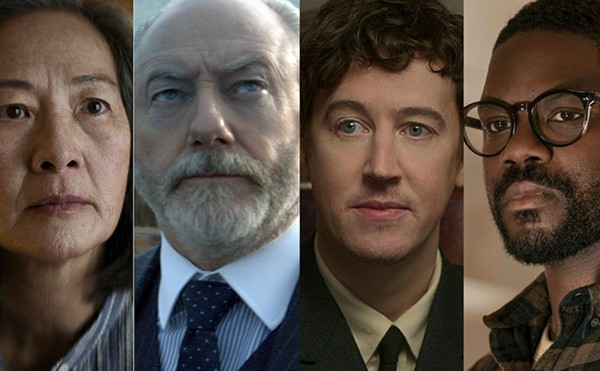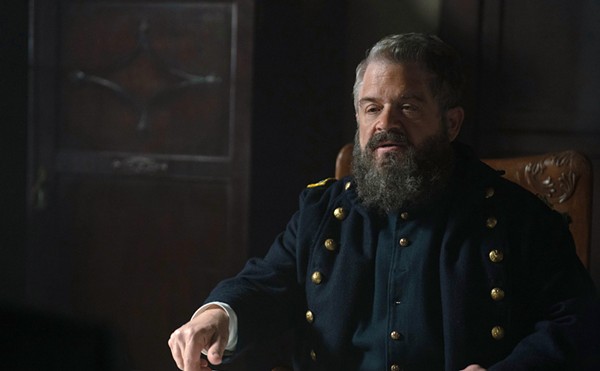| And the nominees are: Abigail Breslin in Little Miss Sunshine, Babel director Alejandro González Iñárritu, Helen Mirren in The Queen, and Forest Whitaker in The Last King of Scotland. Courtesy photos. | |||
So let’s say it again: The Oscars are a farce. That doesn’t mean they’re not fun, though.
“It’s funny, because our film is about rejecting the notion of beauty contests
— so we’re very conflicted,” Jonathan Dayton, co-director of Little Miss Sunshine, said recently at the Santa Barbara International Film Festival, which has become one of the last stops for nominees before the circus lands in Hollywood. Sunshine is a Best Picture nominee — the only one that didn’t also garner a Best Director nomination.
“To compete is uncomfortable,” Best Director nominee for Babel Alejandro González Iñárritu added, seated not far from Dayton on the film festival’s panel. “It’s something a little childish, because these films are so different.” Later, he explained how he cast Rinko Kikuchi as a deaf Japanese girl, following an early attempt to cast an actress who was actually deaf. In these auditions, he would offer his poor English to a Japanese translator who would then pass the message on to a sign-language translator who would then share the message with the deaf actress. “Babel,” Iñárritu describes it, laughing.
Helen Mirren, Best Actress nominee for playing Queen Elizabeth II in The Queen in the same year she won an Emmy for playing Queen Elizabeth I in HBO’s Elizabeth I, arrived in Santa Barbara even more stunning in person than onscreen. She had her own feelings about all the attention that’s been heaped upon her in the past few months.
“Awards are great,” she said. “You have to enjoy the flattery of it. But it’s a little bit disturbing to us.” (Not the royal “us” — she means actors.) “I know how transitory these things are. It comes and goes. It’s wonderful when it comes” — she smiles — “but it’s not so bad when it goes.”
Mirren eventually complained about the microphone she was forced to hold near her mouth. “It’s so phallic,” she sighed. “I find it awfully embarrassing.” And then, revealing just how crass a queen can be, flicked her tongue at the mic’s head, drawing great laughter and applause from her audience.
“She is completely transcendent in this part, I think we’d all agree,” Peter Morgan, Best Writer nominee for The Queen, said of Mirren.
Morgan took the time to discuss his screenplay, too, which tackled the week that followed Princess Diana’s death and the handling of the tragedy by the House of Windsor and Prime Minister Tony Blair.
“I think it’s accurate, but I’m just the guy who made it up,” he said. He also admitted Blair had recently written him and, though Blair claimed to have not seen the movie yet — which Morgan doesn’t buy — the Downing Street resident did say, in Morgan’s words, “When I resign, perhaps we can get together and I’ll tell you what you got right and what you got wrong.”
Al Gore, who with An Inconvenient Truth (Best Documentary nominee) director Davis Guggenheim, was awarded the David Attenborough Award for Excellence in Filmmaking by the Santa Barbara International Film Festival, conceded that he now realizes filmmakers have the power to effect change and reach far more people than he could “traveling from city to city with my slide show.” The former vice president and recent Nobel Prize nominee had no problem explaining why Guggenheim’s documentary about his crusade to halt global warming resonated with so many. “We had a big ally,” he said. “Reality.”
Forest Whitaker, Best Actor nominee for The Last King of Scotland (also written by Peter Morgan), summed up this year’s nominees best: “It seems to me that filmmakers are starting to take chances, and studios are seeing these as chances people want to see, too.”
He’s right and wrong. Filmmakers have always taken chances. The studios have just finally figured out it’s more profitable to turn a $10,000,000 flick into a small hit than a mega-budget action flick into a stock-crashing disaster. The Academy Awards are a sham, but, then again, so are studios that support it.


















